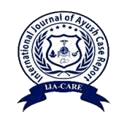Chronic Idiopathic Thrombocytopenic Purpura (ITP) and its management through Unani system of medicine: A Case Study
Abstract
ITP is an auto-immune disorder which is characterized by the production of auto-antibodies targeted toward platelets, in this event T-cells directly attack platelets. On the basis of clinical presentation, Idiopathic thrombocytopenic purpura is classified into acute and chronic forms in which severe bleeding, or insidious with slow development with mild or no symptoms occurs. Corticosteroids and intravenous immunoglobulins were the mainstay of immediate treatment after 1950s with splenectomy for more than 100 years remains the only optionfor treatment. Unani System of Medicine is based on the Concept of Humours i.e., Nazariya-e-Akhlāt,according to which the four akhlāt (dam (blood), balgham(phlegm), safrā’ (yellow bile) and sawdā’) are found mixed in right proportion in the body during the state of health but when there is dyscrasia, disequilibrium occurs in this proportion, the diseases arise. According to Unani System of Medicine, ITP is thought to be the disorder of akhlāt due to alteration in quality and quantity of normal blood components. Thus the mainstay of treatment of ITP in in Unani System of Medicine is focused on correcting the humoral imbalance and restoring the equilibrium.

This work is licensed under a Creative Commons Attribution-NonCommercial-NoDerivatives 4.0 International License.

